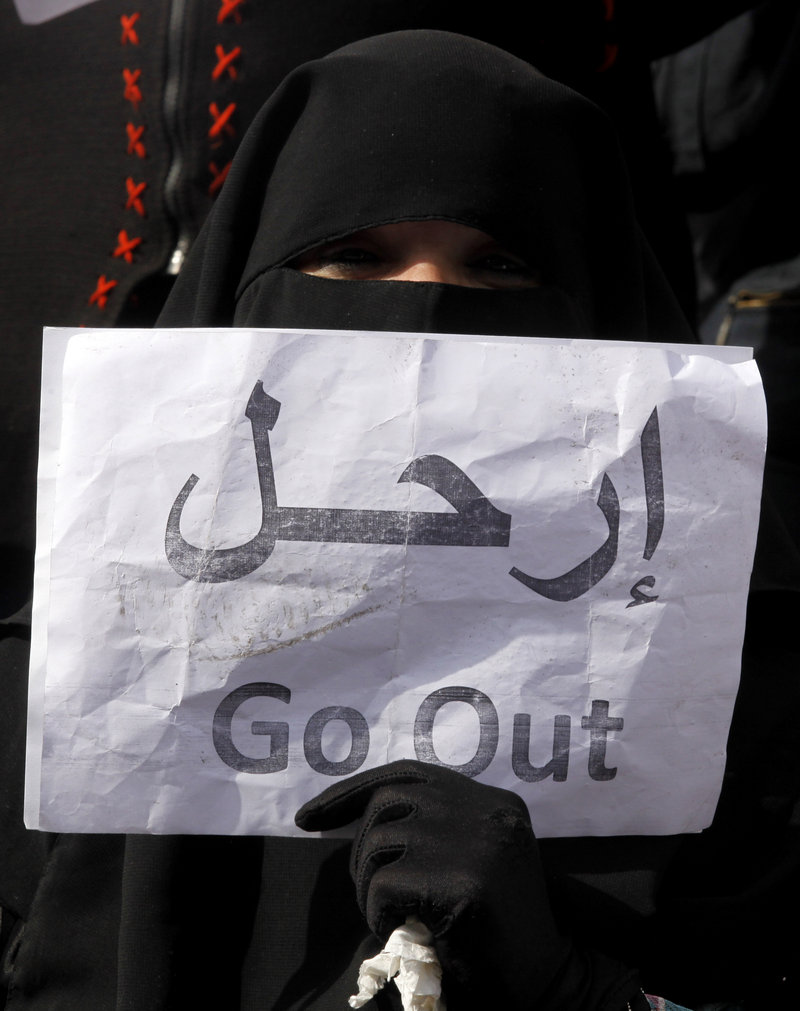I’ve been watching live coverage of the events in Cairo and the feeling that among those millions of people of all ages gathering in the square, the spirit of kindness, love, peace and determination prevails – a vibe that we felt during the ’60s and ’70s in Golden Gate Park.
We shared food, water, blankets and kisses and now what an inspiration to see a throng of millions united in peace while demanding the right to be themselves free from the oppression of a dictator.
Now, as before, the U.S. leadership has taken the wrong side of history by pouring billions of dollars into dictatorships around the world.
My heart goes out to all those gathering today in Cairo. Please protect them, they are all living treasures and beacons of authentic democracy and hope.
Roy Shigley
Portland
Egypt, one of the “cradles of civilization,” is the latest nation being rocked by unrest and a loss of civic civility. Civic civility is the orderly process by which free citizens lawfully engage their government, which serves the public need and exists for the public good.
One does not have to be in the Nile to be in denial.
Over time, even yielding grass will destroy the rigidity of concrete. All living things are hard-wired for the freedom to fulfill their potential. It is a force that can only be tamped down, never eliminated.
Leaders of all levels of public service (local, state, national) must understand that freedom (like oxygen) is the very life of the individual and the larger community. The spirit of freedom, like faith the size of a mustard seed, will move mountains of resistance.
The repeated expression for freedom may be best explained by the words of Victor Hugo, that nothing is greater than an idea whose time has come.
Bullets can only temporarily change behavior and never change beliefs.
Let us be mindful of freedom’s lessons to be relearned as we witness the “rebirth” of a nation. Those who embrace life give voice to the desire for freedom. Thus it has always been and thus it shall always be.
They are not alone. They are only the next ones to take and stake their place on terra firma, collectively shouting to those in power, “You must hear that we are here.”
John Jenkins
EPI-Center, President/CEO
Lewiston
President Obama has a very difficult task in dealing with the situation in Egypt. On one hand, Egypt is a powerful ally that has anchored U.S. Middle Eastern policy. On the other hand, if the president is true about his claims for spreading democracy, then he ought to support the protesters.
Either way, it is a very tough predicament for a president who abhors human rights abuses. While it may be a tough decision politically, the president was right to call upon Hosni Mubarak to step down.
John Tranfaglia
Cape Elizabeth
My wife and I lived in Tunis from 1979 to 1984. When we left early in 1984, the situation was the same as discussed in Trudy Rubin’s Jan. 25 op-ed column, “What’s different in Tunisia after the revolt?”
The revolt in ’84 was precipitated directly by an overnight doubling of the price of eggs and bread, the staples of a common Tunisian.
There was underlying unrest as described in the column. People and soldiers were in the streets. Tanks were at each major road intersection.
Prices were eventually lowered. Things calmed down. An interim government took over. After several years, the prime minister who was just removed took over.
Now things have repeated themselves.
The author of the column correctly points out that the political middle is weak or non-existent in Tunisia, as in most Arab countries.
It is a shame, but if Tunisia has trouble organizing itself, it is hard to imagine any of the rest doing so. The situation is ripe for leadership from one end of the political spectrum or the other.
I don’t find any answers to the problem forthcoming. I do not have any.
If we could get our own act together perhaps we could offer believable assistance to others.
I guess my message is: Let’s get our own business in good shape and then offer assistance to others. Unfortunately, that is easier said than done.
Peter Swinchatt
Topsham
Clean Election laws allow way to fight special interests
Thank you for publishing Brunswick School Board member Michelle A. Small’s thoughtful Maine Voices column (“Gov. LePage goes beyond the minimum on disclosing contributions,” Jan. 21) about the anniversary of the U.S. Supreme Court’s Citizens United decision.
A year later, it’s pretty clear that the court has given special interest money a central role in federal elections. As predicted, the money in the 2010 elections flowed like never before.
Here in Maine, citizens have the central role, not special interests. And citizens step up to take part year after year. We participate by signing petitions, getting to know candidates, voting and checking “yes” for clean elections on the Maine income tax form.
Our landmark Clean Election system runs on voter power. It is fueled by tiny contributions from Maine voters and taxpayers, and that means that candidates here don’t have to raise large contributions from special interests.
With 80 percent of candidates opting to use the system in the last election cycle, special interest influence in Maine is limited.
And one of the best ways to keep it that way is to check “yes” on Line 1 of your Maine income tax form. Your tax bill won’t go up, and your refund won’t go down.
Despite Citizens United, here in Maine we can and do limit the influence of special interests. I hope everyone will remember to check “yes” for clean elections.
Jill Ward
South Portland
Send questions/comments to the editors.



Comments are no longer available on this story